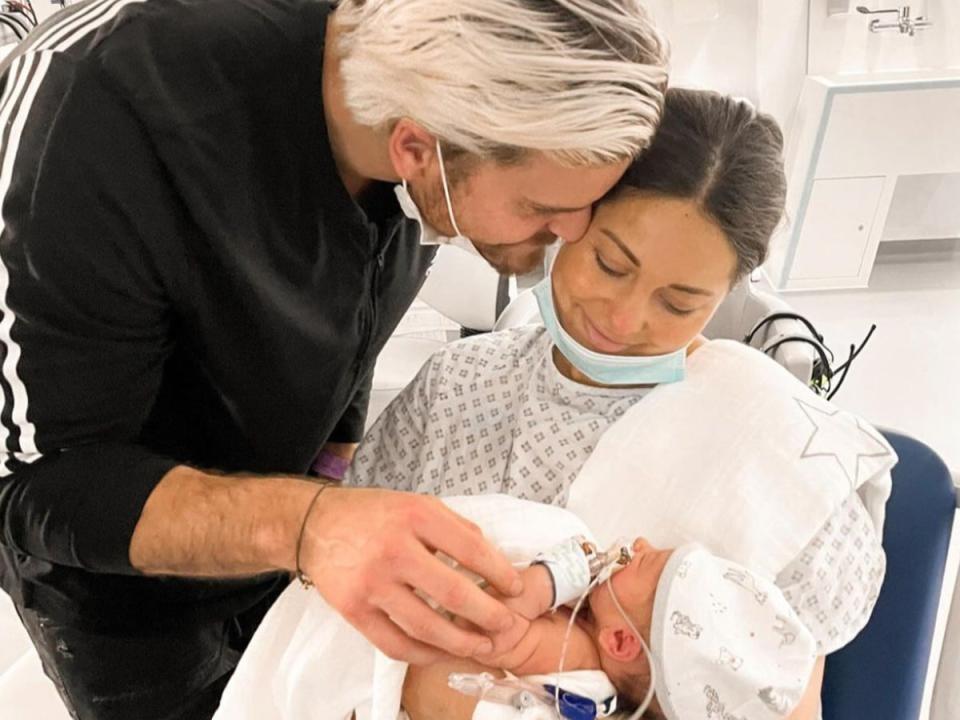Louise Thompson opens up about traumatic birth ordeal that almost took her life and left her with a stoma bag
Louise Thompson has opened up about the traumatic experience of giving birth to her son Leo, and its harrowing aftermath.
The 34-year-old former star of Made in Chelsea was forced to have an emergency caesarean in November 2021 after a series of difficulties with the hospital where she had her natal care.
The event led to a series of physical and mental complications which led to haemorrhages, the removal of her colon, fitting of a stoma bag and a series of newly diagnosed physical and mental health conditions.
The influencer was forced to undergo the emergency procedure while she was awake and not under general anaesthetic, while she watched blood pour out of her in a haemorrhage. She was told an artery had been nicked and that there had been a uterine rupture.
“I could literally feel the doctors up under my lungs. Leo had to be pushed back up so that they could lift him out,” she told The Times.
The end was not in sight, as her son who she shares with fiancé and former co-star Ryan Libbey, stopped breathing during the procedure. He was resuscitated and taken into intensive care immediately after.
She then experienced a second haemorrhage while recovering in her home.
“I was in very bad pain. Then blood started pouring out of me like a hose. That [second] haemorrhage almost did take my life.”
The experience left her with post-traumatic stress disorder (PTSD), a condition which affects 1 in 20 mothers after giving birth.

The anti-depressants she took to control her thoughts of suicide, depression and dissociation triggered her pre-existing ulcerative colitis, which worsened until it was deemed untreatable. She was forced to have a procedure to remove part of her colon, leaving her with a stoma bag.
Thompson says she was left “begging for the stoma surgery” by the end of the experience as she was experiencing so much pain and losing blood through her anus on a regular basis.
“Which will almost certainly be permanent,” she said of the stoma bag, which she has since named “Winnie” after the famous cartoon bear.
“In a very short period of time I went from being somebody who was so fit that I was on the cover of a health magazine to a person with chronic health issues.”

Meanwhile, taking medication for her ulcerative colitis led to her being diagnosed with the autoimmune condition, lupus.
After the uterine rupture and caesarean, Thompson was diagnosed with Asherman’s syndrom – a condition where scar tissue within the womb fuses together meaning that an embryo cannot implant and a baby can never be safely delivered again.
“By then I just felt so lucky to have Leo,” she said of the news.
The mother and businesswoman, who was already on medication including anti-psychotics for her mental health, was forced to wait 12 weeks before the charity Crisis could provide her with psychiatric help and further medication. She was unable to go to a specalist mother-and-baby unit, explaining: “My baby was my trigger. There was no way I could have been with him.”
The TV personality has written about her experience in her forthcoming book, Lucky: Learning to Live Again, which will be released on Thursday (16 May).
“I was very unlucky because I had this cascade of events happen to me. ‘Old Louise’ would have been fuming because when I wanted something in the past, I made it happen. But none of it matters, not even the fact that I can’t carry another child. It’s over now — and I’ve been given a second shot at life.”
Thompson is not the only celebrity raising awareness and reducing stigma around the use of stoma bags. The Traitor’s Mollie Pearce told The Independent that while she couldn’t imagine having her stoma when she was younger, she is committed to raising awareness about their importance.
“I really do want to keep raising awareness and educating people, because a lot of people just don’t know what colitis is,” she said. “I’ve had people say to me, ‘Did you pick that up off the toilet seat?’ I just think, ‘No babe, I didn’t. But that’s crazy you think that.’ It needs to be spoken about a lot more. And a lot of people think that stomas are smelly and disgusting, when in reality they are so clean and they save people’s lives. They’re seen as such a negative and we need to change that narrative.”

